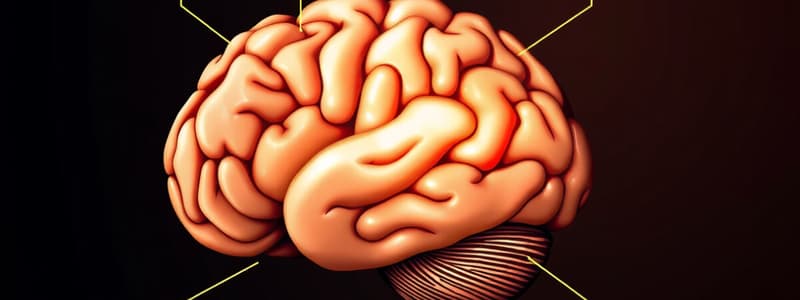Podcast
Questions and Answers
What are the three types of long-term memory?
What are the three types of long-term memory?
- Semantic (correct)
- Procedural (correct)
- Short-term
- Episodic (correct)
What does episodic memory refer to?
What does episodic memory refer to?
The ability to recall events from our lives.
What type of memory is linked to knowledge of the world?
What type of memory is linked to knowledge of the world?
Semantic memory.
What does procedural memory help us recall?
What does procedural memory help us recall?
What types of evidence support the classification of long-term memory?
What types of evidence support the classification of long-term memory?
What is a notable observation about the case studies of HM and Clive Wearing?
What is a notable observation about the case studies of HM and Clive Wearing?
What does neuroimaging evidence suggest about memory?
What does neuroimaging evidence suggest about memory?
What are real-life applications of understanding long-term memory?
What are real-life applications of understanding long-term memory?
Flashcards are hidden until you start studying
Study Notes
Types of Long-Term Memory
- Long-term memory comprises three types: Episodic, Procedural, and Semantic.
Episodic Memory
- Involves recalling personal life events or episodes, akin to a diary.
- Memories are 'time-stamped,' allowing recall of when events occurred.
- Represents a cohesive unit of memory including people, places, and actions.
- Requires conscious effort to access, such as recalling past dentist visits.
Semantic Memory
- Contains general knowledge of the world, encompassing facts and concepts.
- Similar to an encyclopedia or dictionary, including diverse topics like emotions and everyday knowledge.
- Unlike episodic memory, semantic memories lack 'time-stamps' and are more universal.
- Continuously evolving, incorporating new information and concepts.
Procedural Memory
- Memory for skills and actions, functioning without conscious effort or awareness.
- Examples include driving a car or performing a musical piece.
- Skills may be challenging to articulate; one may find it easier to perform than to explain.
Evaluation of Long-Term Memory Types
- Supported by clinical evidence, neuroimaging findings, and real-life applications.
Clinical Evidence
- Case studies of HM and Clive Wearing illustrate impairments in episodic memory due to amnesia.
- Both individuals retained semantic understanding but struggled with recalling personal events.
- Procedural memory remained intact, allowing for tasks like walking or playing instruments.
Neuroimaging Evidence
- Brain scans reveal distinct brain regions for storing different memory types.
- Tulving et al. (1994) found that episodic and semantic memories activate the prefrontal cortex.
- The left prefrontal cortex is linked to semantic recall, while the right is associated with episodic recall.
- Emphasizes the physical reality of memory types within the brain, validated by subsequent studies.
Real-Life Applications
- Understanding memory types helps psychologists enhance individuals' lives.
- Research by Bellville et al. (2006) demonstrated that improvements in episodic memory are possible in older adults with cognitive impairments.
Studying That Suits You
Use AI to generate personalized quizzes and flashcards to suit your learning preferences.




